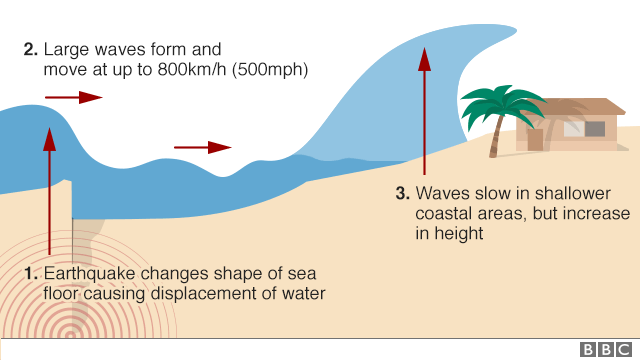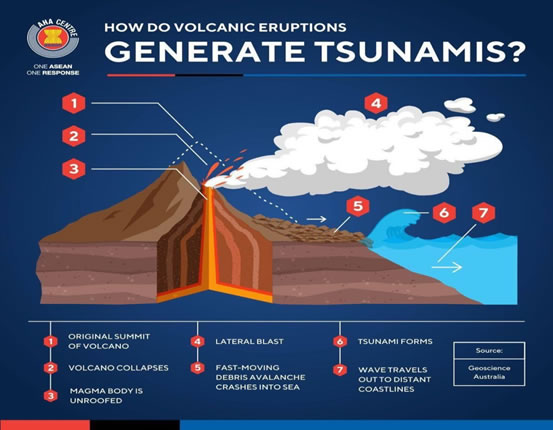What are the causes of a tsunami?
Weather of Arabia - Tsunami waves over the past two decades have caused nearly 10% of the economic losses caused by disasters, especially in countries located on the Indian and Pacific oceans, and in the past 100 years, 58 tsunami disasters have killed more than 260,000 people (an average of 4,600 people per disaster), which exceeds other natural hazards. What is a tsunami? And why does it happen?
What are tsunami waves?
The name "tsunami" comes from the Japanese language, from the two syllables: "tsu" (meaning port) and "nami" (meaning wave). A tsunami is a series of huge waves caused by underwater disturbances that occur mainly due to earthquakes, and tsunamis often occur close to the shore and cause natural, human and economic disasters.
Tsunami waves differ from ordinary sea waves in speed, size and losses that result from them, as their speed ranges between 500 and 700 km and sometimes 850 km/h, and their height reaches 40 m. The interval between two giant waves ranges from a few minutes to several hours.
What are the causes of tsunamis?
Tsunamis are mainly caused by earthquakes, but they can also occur for other reasons such as volcanic activities, coastal landslides, and even space objects falling and colliding with water bodies.
earthquakes
Not all earthquakes cause tsunamis. There are four conditions necessary for an earthquake to produce a tsunami, which are:
- An earthquake occurs under the ocean or as a result of landslides in the ocean.
- The earthquake must be strong, at least 6.5 on the Richter scale.
- The earthquake occurs at a shallow depth, less than 70 km below the surface of the earth.
- The earthquake causes a vertical movement of the sea floor (up to several metres) which causes the displacement of the water mass.

(An earthquake may occur in the ocean due to the presence of movement on the fault, which causes turbulence in the ocean water that is transmitted in the form of fast waves that slow down when they reach the shallow areas near the coasts, so they increase in height and hit the beaches strongly)
landslides
A landslide that occurs along the coast can push large amounts of water toward the sea, disturbing the movement of the water and thus generating tsunamis. Underwater landslides can also trigger tsunamis when material floating in landslides moves violently, forcing water in front of them.
volcanic activities
Violent volcanic activity may also cause disturbances in the ocean, when magma (with debris on its way) reaches the ocean, which can displace a large amount of water and generate very destructive tsunamis in the vicinity.

(When violent volcanic activity occurs, magma and debris quickly rush into the ocean, causing disturbances and tsunamis)
Indonesia is one of the areas most prone to tsunami waves, due to its location near the so-called " Ring of Fire ", where earthquakes and volcanoes frequently occur. One of the largest devastating tsunami disasters occurred there on August 26, 1883, after the explosion and collapse of the Krakatoa volcano in Indonesia. . This explosion generated tsunami waves up to 41 meters in length , destroying coastal towns and villages along the Sunda Strait on both the islands of Java and Sumatra, killing 36,417 people.
Collision with extraterrestrial bodies
Tsunamis caused by collisions with extraterrestrial objects such as asteroids and meteorites are extremely rare. Although no tsunami has been recorded as a result of a meteorite or asteroid in modern history, scientists know that if these celestial bodies collide with the ocean, they will undoubtedly cause the displacement of large amounts of water, and thus cause a tsunami disaster.
Arabia Weather App
Download the app to receive weather notifications and more..



